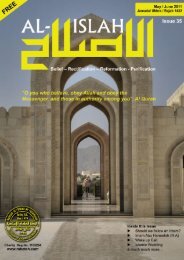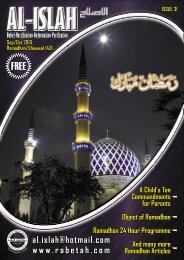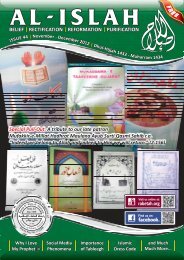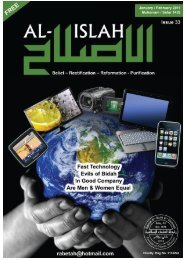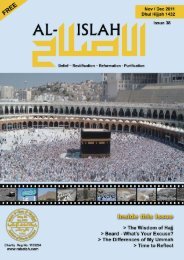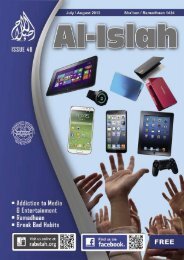Issue 29 www.rabetah.com May/June 2010
Issue 29 www.rabetah.com May/June 2010
Issue 29 www.rabetah.com May/June 2010
- No tags were found...
Create successful ePaper yourself
Turn your PDF publications into a flip-book with our unique Google optimized e-Paper software.
Women's Page<br />
Real Beauty Is The Inner Beauty:<br />
Men and women are equal but not identical. Each of<br />
them <strong>com</strong>plements the other in the different roles<br />
and functions that they are responsible for. In Islam<br />
the individuals should not be judged according to<br />
gender, beauty, wealth or privilege. The only thing<br />
that makes one person better than another is his or<br />
her character. Therefore women are judged by her<br />
character and actions rather than by her looks or<br />
physical features.<br />
Islam ordered the same high standards of moral<br />
conduct for men as it is for women. Modesty is<br />
essential in a human's life, as well, whether it is in<br />
action, morals or speech. A woman who adheres to<br />
the tenets of Islam is required to follow the dress<br />
code called Hijab. Islam also <strong>com</strong>mands proper<br />
behaviour and dress of men, in that they are not<br />
allowed to make a show of their bodies to attract<br />
attention onto themselves, and they too must dress<br />
modestly. They have a special <strong>com</strong>mandment to<br />
lower their eyes, and not to brazenly stare at women.<br />
The Islamic veil, unlike the veil of the Christian<br />
tradition, is not a sign of man's authority over woman<br />
nor is it a sign of woman's subjection to man. The<br />
Islamic veil, unlike the veil in the Jewish tradition, is<br />
not a sign of luxury and distinction of some noble<br />
married women. The Islamic veil is only a sign of<br />
modesty with the purpose of protecting women, all<br />
women.<br />
The Islamic philosophy is that it is always better to be<br />
safe than sorry. In fact, the Qur'an is so concerned<br />
with protecting women's bodies and women's<br />
reputation that a man who dares to falsely accuse a<br />
woman of unchastely will be severely punished:<br />
"And those who launch a charge against chaste<br />
women, and produce not four witnesses (to support<br />
their allegations), Flog them with eighty stripes; and<br />
reject their evidence ever after: for such men are<br />
wicked transgressors (evil doers)."<br />
Muslim women need not feel the pressures to be<br />
beautiful or attractive, which is so apparent in the<br />
Western and Eastern cultures. She does not have to<br />
live up to expectations of what is desirable and what<br />
is not. Superficial beauty is not the Muslim woman's<br />
concern; her main goal is inner spiritual beauty. She<br />
does not have to use her body and charms to get<br />
recognition or acceptance in society.<br />
Women acquire real respect and honour through<br />
Islam. Women should acknowledge this and<br />
understand their true worth. By striving in the path of<br />
Allah and by submitting towards his laws is showing<br />
gratitude. <strong>May</strong> Allah enable all women to understand<br />
this precious message and to value it, Ameen.<br />
READ THE LATEST & PAST ISSUES<br />
OF<br />
AL-ISLAH ONLINE :<br />
<strong>www</strong>.<strong>rabetah</strong>.<strong>com</strong>/emagalislah.htm<br />
STORIES OF PIOUS WOMEN<br />
Maulana Ashraf Ali Thanwi (Rahmatullahi Alayh)<br />
An old woman in the army of Mûsâ ‘alayhis salâm<br />
When Pharaoh began persecuting the Banû Isrâ'îl in Egypt, <strong>com</strong>pelling them into labour, beating them and<br />
oppressing them, Allah <strong>com</strong>manded Mûsâ „alayhis salâm to leave Egypt together with the Banû Isrâ'îl on that<br />
very night so that they may be saved from the oppression of Pharaoh. Consequently, Mûsâ „alayhis salâm left<br />
with the Banû Isrâ'îl. When they reached the Nile river, they forgot the road. No one could recognize the road.<br />
He became surprised and shouted out: "Whoever is acquainted with this area should please <strong>com</strong>e forward and<br />
show us the way." Upon this an old woman came forward and said: "When Yûsuf was about to leave this world,<br />
he made a bequest to his brothers and nephews that if at any time you have to leave Egypt, you must carry my<br />
coffin, in which my body will be, together with you to wherever you are going. As long as you do not take the<br />
coffin, you will not find your way." Mûsâ „alayhis salâm asked the whereabouts of the coffin. No one knew the<br />
place except for that very same old woman. When he asked her, she replied: "I will not show you the place until<br />
you guarantee me one thing." He asked: "What is that? She replied: "You must guarantee me that I will die on<br />
îmân and that I will be wherever you are in jannah." Mûsâ „alayhis salâm raised his hands and said: "O Allah!<br />
That which she is asking me for is not in my power." Upon this he was ordered: "You give the guarantee, I will<br />
fulfil it." He therefore gave her the guarantee and she showed him the place where the coffin could be found<br />
buried in the centre of the river. The moment the coffin was removed, they found the road.<br />
Lesson: Look at how pious this old woman was in that she did not ask for any of the treasures of the world.<br />
Instead, she successfully organized the hereafter for herself. O women! You also abandon your lust and desire<br />
for this world. You will receive (of this world) whatever has been written for you. Instead, put your Dîn in order.<br />
<strong>Issue</strong> <strong>29</strong> <strong>www</strong>.<strong>rabetah</strong>.<strong>com</strong> <strong>May</strong>/<strong>June</strong> <strong>2010</strong><br />
13





